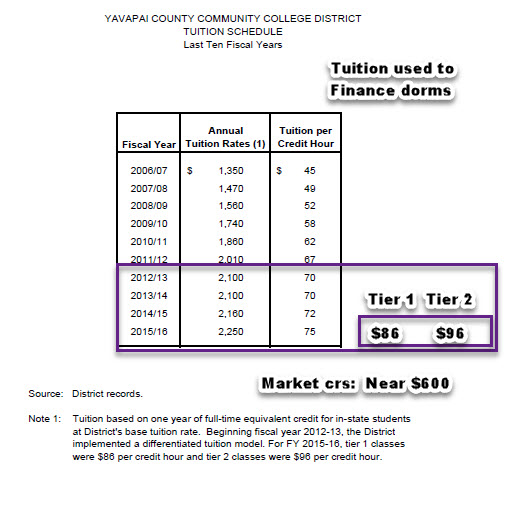Does Attorney General Brnovich’s lawsuit against Arizona Board of Regents for not adhering to a State constitutional requirement that tuition for residents attending state universities be “nearly as free as possible” raise legal issues for Yavapai?
On September 8 Attorney General Mark Brnovich filed a complaint against the Arizona Board of Regents claiming board members have “dramatically and unconstitutionally’’ increased the cost of going to one of the state’s three universities. He argued that Arizona’s Constitution, article XI, § 6 was violated. It states that “The university and all other state educational institutions shall be open to students of both sexes, and the instruction furnished shall be as nearly free as possible.”
Does the fact that student tuition at Yavapai Community College is specifically used to pay off revenue bonds that were sold to renovate the student residence halls violate that Amendment? After all, the Governing Board could have asked voters to approve a General Obligation Bond to pay for renovation rather than put the debt on the shoulders of student tuition.
Does the fact that over the past ten years the Governing Board has increased tuition in some form at a rate far above inflation while spending an estimated $100 million on capital projects, using money paid from primary taxes for those projects, rather than applying those funds to keep tuition low, violate the State Constitution? After all, the Governing Board could have sought voter approval via General Obligation Bonds to pay for those expensive projects.
Does the fact that tier 2 courses cost double what they cost ten years ago or that in some alleged “market based courses” students pay over $500 per credit hour violate the Constitutional provision to keep tuition as “nearly free as possible”?
Maybe this lawsuit will bring about some answers to those questions. Maybe the Yavapai Community College District Governing Board might even discuss this issue—but probably not. The Blog assumes the Board with Deb McCasland most likely dissenting will push through another tuition increase in excess of inflation in February or March 2018 while continuing to spend millions on capital projects using primary tax money rather than ask voters to approve General Obligation Bonds for the projects. After all, given its history, does anyone really believe there will be a serious attempt by the Yavapai Community College Governing Board to keep tuition as “nearly free as possible?”

